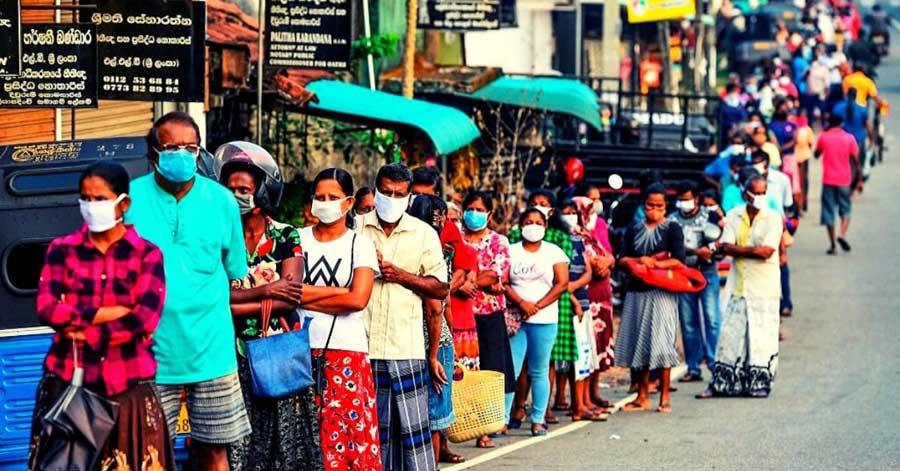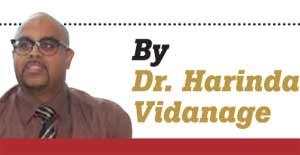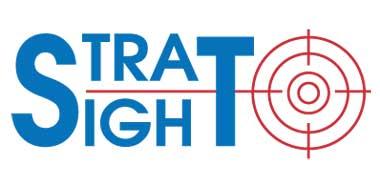30 Mar 2020 - {{hitsCtrl.values.hits}}

People queued up when curfew was lifted
This analysis focuses not on the COVID-19, but on its effect, the author wishes to address a significant thinking gap that is emerging whilst policy makers locally and globally are battling the virus and its immediate aftereffects. COVID-19 will eventually peak at a certain point and the virus will recede yet the enormous disruption it has caused at a mega scale will not. 
Thus, the world is heading to a point of a total reset, what will be the shape of world trade, finances, geopolitics has become a major concern among strategic thinkers. This article explores these concerns and solutions briefly while focusing on challenges and opportunities that rise for a small power such as Sri Lanka.
First and foremost, from an economic perspective, the world has hit a tipping point, as we have entered a new condition that is named as the pandemic economy. In this situation the relationship between supply and demand, the fundamental pillars of the modern economic system is in a crisis. Irrespective of people’s capability or desire to spend consumers cannot do so, sellers despite their best efforts are finding it even hard to sell, thus creating a fundamental disjuncture in the economy.
In a pandemic economy, regardless of their desire to spend, consumers are unable to do so, because they have been urged or ordered to stay home. Despite their willingness to sell, stores cannot reach their customers, and many are cut off from their suppliers. Thus, the global economic circuit has become short circuited and to make things worse, measures such as social distancing and quarantine are creating havoc among economic systems and markets reliant on connectivity, interaction and networks.
Advanced economies are trying to repeat salvage packages like that were offered during 2008 financial crisis. The United States is finalizing a mammoth $2 Trillion stimulus package while Britain is considering providing nearly $400 million loans to businesses that are affected and an overall $80 billion to Singapore offering $40 billion stimulus package. Whilst they are substantial the fundamental difference from 2008 is that for another 12-18 months most countries will have to adopt minimalist lockdowns or long-term social distancing as there is no real projections of the effects of second, third wave outbreaks of covid19. This means massive declines in consumption and production across countries for a sustained period.
As Health and safety of citizens has become the absolute national security drive, States are adopting measures that block exports of critical goods or resorting to methods of producing vital medical products only for their national market. This comes at the cost of hurting the global economy, downgrading diplomatic relations further slowing down an already stalled globalized economy.
From Germany, which is the economic stalwart and lynchpin of the EU to Russia and Turkey there is an overall ban on exports of masks. China has the total stake in mask production and has a controlled effect on where they  can be distributed or sold. The two largest medical equipment producers in the world Qiagen which is of Dutch origin now under an American management and Roche laboratories headquartered in Switzerland are under immense pressure for equipment relating to COVID-19 detection
can be distributed or sold. The two largest medical equipment producers in the world Qiagen which is of Dutch origin now under an American management and Roche laboratories headquartered in Switzerland are under immense pressure for equipment relating to COVID-19 detection
and care.
Medical community is alarmed that these pressures may slow the production of other vital equipment needed to treat and diagnose patients suffering from many diseases. Roche laboratory is under pressure from the Trump administration to come up with a vaccine for COVID-19 only for the US market.
All these moves are signalling a shift in how global economies and markets functioned and these are political decisions that will have a profound impact on the future of open trading systems and the concept of free and fair market the liberal pillars of the current economic order. With countries seeking self-sufficiency to fight the outbreak, such measures are unravelling the globalization that enabled the free market societies to prosper and progress. These are the stark symbolisms of the COVID-19 effect that will lead to a complete reset of the global systems if sustained with no course correction.
Joseph Nye, the scholar who coined the term Soft Power, argues that in the 21st Century, power is transitioning from the traditional geopolitical West to the East, basically Asia. In the case of the COVID-19 outbreak there is a clear shift of epicenters from East to the West and in its path the impact seems to be of a magnitude far greater than the other.
From Wuhan in China to Northern region of Lombardy in Italy to New York, the great Eastern financial hub of the United States, the Epicenter has shifted. Thus, North America and the Eurozone seems to have been hugely underprepared to deal with the crisis. Whilst China bolstered their supply of masks, ventilators, ICU facilities to virus detection kits the United States is struggling to cope at all departments. Thus, if one is to ascertain and measure power of a State beyond the metrics of hard and soft power, the US and Europe paint a sorry picture today.
Sri Lanka’s initial response has been robust, in the previous analysis of this column presidential task force was strongly suggested and it has come into fruition the social distancing and enforced lockdowns are mitigating primary infection levels. We badly need an information arm of the task force, Federal Emergency Management Agency (FEMA) in the United States have set up a dedicate web page for rumor management. If Sri Lankan government fail to get a grip of an authentic narrative the contagion will be of misinformation more than the virus with serious consequences.
These global transformation from economics to politics will have a serious long-term impact as we still rely heavily on the global supply chain from consumer goods to energy products. Global supply chain disruption has become a huge challenge for all economies. Already, Sri Lankan manufacturers are complaining of shortages of raw materials.
"In a pandemic economy, regardless of their desire to spend, consumers are unable to do so, because they have been urged or ordered to stay home"
The government must support our local manufacturers and help them to plug into supply chains that are still functioning and provide them expertise on how to reconfigure in case of emergencies. Certain limited stimulus packages may need to come in effect, the current commitment is less than 0.5% of the GDP whilst the Singaporean equivalent is 11% with Germany’s stimulus of $800 billion is the largest out of all packages making it nearly 20% of the GDP.
The government must look in the long-termchallenges of, future of work. We still have a hefty state sector, the idea of future of work as a doctrine has still not reached our public sector. Analysts of organizational behavior argue, that we are witnessing the most rapid organizational transformation in the history of the modern firm. The virtual work we were accustomed to such as online banking, online purchasing to Uber was the connectivity between the business and the client. COVID-19 effect is pushing organizations to digitize the relationship with its own employeesin every sector.
This transition in Sri Lanka and in many sectors will be a necessity even after the initial out break from public services to schools and universities this new division of labour and processes demand a serious change not just in structure but in mindset. Policy makers are pushed to be critical thinkers and innovators thus to facilitate that we need a new government not just made out of seasoned professional politicians or the new aspiring professionalswho want to be in the driving seat; but of Sri Lankans who can think and are visionaries who see the future even through chaos. Thus, COVID-19 effect is presenting us with an opportunity to choose not just our future but who will take us there.
06 Jan 2025 55 minute ago
06 Jan 2025 2 hours ago
06 Jan 2025 2 hours ago
06 Jan 2025 2 hours ago
06 Jan 2025 2 hours ago